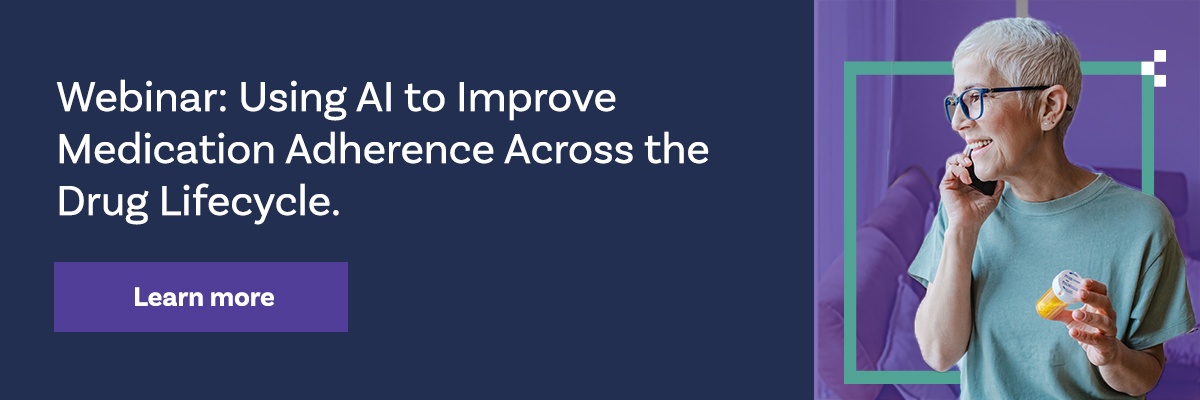The Power of Personalization at the Individual Level in Healthcare
A paradigm shift has occurred within healthcare and that has accelerated an industry wide focus to a personalized approach, focusing on a holistic understanding of the patient. Patients have become consumers with the freedom to make decisions about their health journeys and, in turn, how, where and when they spend their money when it comes to their healthcare choices.
This is where a data-driven approach to patient support programs (PSPs), underpinned by artificial intelligence (AI), has the opportunity to become a hallmark of effectiveness and efficiency in the New Healthcare Economy — which is marked by rising consumerism, aging populations, and an increased focus on value-based care, specialty medicines, and personalized health. Predictive AI technologies use machine learning to analyze patient-level data for insight into potential future behaviors and outcomes. Leveraging this data can powerfully support consumer-centric, next-best-action modeling, bringing greater value overall to a patient’s experience and support – and dramatically better efficiency for PSPs and omni-channel outreach.
This level of predictive capability can also help bridge the gap between live and digital support, facilitating initiation and adherence in the new world of hybrid healthcare experiences.

However, one must be aware that not all personalization is the same, though it may be branded as such.
Going Beyond Personas: The Differences in AI-Powered Approaches
AI is no doubt on the rise, with Precedence Research estimating that the AI market in healthcare will exceed $20.6 billion in 2023, which is nearly double the figure from 2021 ($11.1 billion).
What AI buyers should be aware of though is that not all AI-powered personalization is the same. Oftentimes, personalization is limited to simply swapping out a first name in an otherwise unchanged email or relies heavily on persona-based segmentation. What happens as a result is that patients are targeted in a way that only skims the surface of their lifestyle and preferences. Broad strokes like these are not nearly enough to truly connect with and make a difference for patients.
For example, if two patients on paper have the same demographic parameters (age range, income level, household size), most targeting done by organizations will treat these two patients as the same segment and they receive the same exact experience. Most likely only their names will be swapped out. In reality, a nuanced approach is necessary to connect on a more personalized, effective level.
Some patients respond better to a text and then phone call, whereas others may only require a text. Drilling down into the unique behaviors and patterns of patients allows for a greater impact of timely interventions, more targeted strategies, and more robust personalized PSPs.
In order to accomplish true personalization at the individual level, the industry must understand and leverage continuous value with AI.
Continuous Learning Is a Necessity
While all marketers are already employing some degree of targeting, the integration of AI introduces next-best-action modeling, taking segmentation to a more advanced level and is more effective. AllazoHealth uses identified data for each patient including their social determinants of health, pharmacy fills, demographics, consumer behavior, and intent data. We couple those with the patient’s engagement data across different touch points such as opened emails, clicked links, phone and SMS interactions, mobile app usages, and more.
This comprehensive analysis empowers companies to make more accurate predictions regarding the personalized message that will resonate most with each consumer. This includes identifying the optimal interventions, channels, content, timing, and frequency, resulting in the next-best-action that drives consumer engagement and motivates action.
AI-driven predictive analytics also establishes a real-time feedback loop that continually incorporates new patient interactions, changes in their life, and adjusts insights accordingly. These refined predictions and measurements enable manufacturers to deliver enhanced value to consumers and patients. Consequently, more actionable insights are generated, which can be applied to their omni-channel strategies, creating an ongoing cycle of learning and optimization.
Demonstrating a commitment to continuous learning and optimization showcases the quality of services offered to consumers, thereby boosting patient engagement, medication initiation, and long-term adherence and persistence. By leveraging AI to measure and showcase the impact on patient engagement, organizations can continually improve and refine their outreach and engagement strategies, ultimately delivering greater long-term value to consumers and yielding better returns for their brand.
Predict, Personalize, and Maximize with AllazoHealth
Marketing in the era of consumer-driven healthcare requires new tools and techniques. If you want patients to initiate treatment, you need to connect across more channels, more personally, and in the ways consumers prefer to be engaged.
That’s why the AllazoHealth AI platform has been purpose built to enable one-to-one patient engagement that improve initiation, adherence, patient experience, and health outcomes, while optimizing omni-channel marketing performance and support program operational efficiencies.
A truly personalized approach allows pharma and other healthcare organizations to provide targeted education, support, and interventions that improve patient outcomes, engagement, and program performance – and your PSP could be next. Learn how you can use AllazoHealth’s award winning AI to boost patient engagement and medication adherence, improving patient outcomes, and enhancing performance in the process.
